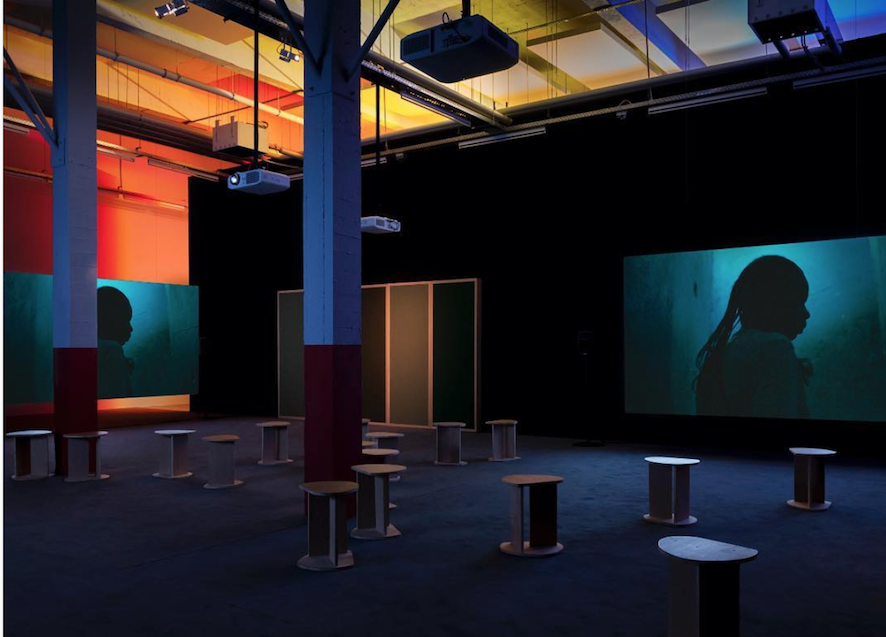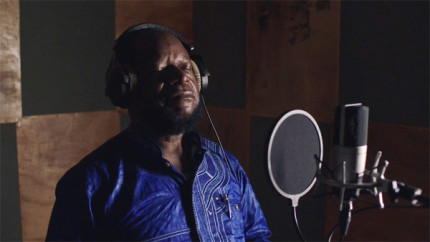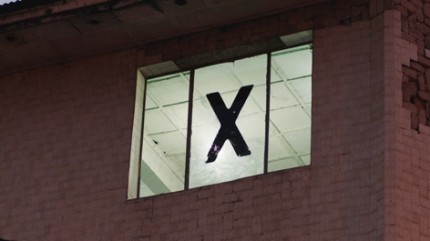One.Two.Three
Audiovisual work by Vincent Meessen, created for the Belgian Pavilion at the 56th Venice Biennale (2015)
“A spectre is haunting the world: the Situationist International”. It was with this allusion to the opening sentence of the Communist Manifesto that the Situationist International, a revolutionary movement and the last international avant-garde movement of Western Modernity, provocatively inscribed itself into future history. The Situationist International has left an imprint as radical as it is indelible on the worlds of ideas and forms. It fundamentally changed the understanding of the relationship between art, politics and daily life, in its instrumental and decisive role during the events of May 68, and in its critique and detournement of forms of market spectacle. Reviled, art was its first target, and we know that ever since, artists have continued to debate and struggle with this critical heritage.
In One.Two.Three, Vincent Meessen begins by circumventing the trap of Situationist mythology, in which Guy Debord has been consecrated as the hero and epicentre of a revolution. Instead, the work revisits a part of the history of this movement which to this day has been ignored. The starting point for the work is the discovery of the lyrics to a protest song that Congolese Situationist Joseph Mbelolo Ya Mpiku, composed in May 1968, in the archives of the Belgian Situationist Raoul Vaneigem. Working with Mbelolo and young musicians in Kinshasa, Vincent Meessen has produced a new rendition of the song. The fragmented cinematographic display of the work offers a spatial translation of this collective arrangement of subjectivities.
The multi-coloured labyrinth of Un Deux Trois, the club that was once home to the world-famous OK Jazz orchestra led by Franco Luambo, a key figure of artistic modernity in the Congo, offers the perfect setting for a musical dérive. Against the background of Congolese rumba, a popular and hybrid genre par excellence, threatened vernacular architecture and revolutionary rhetorics of the past, the film puts to music the narrative of unexpected meetings and one of the forms that resulted from it: Mbelolo’s song.
Transformed into an experimental space by musicians who, in the course of their perambulations, try to get attuned to each other, the club becomes an echo chamber for the impasses of history and the unfinished promises of revolutionary theory. And while Mbelolo Ya Mpiku rediscovers the song he had lost, popular uprisings break out in Kinshasa just outside of the walls of the rumba club. In spite of the cycle of violence and the militarisation of everyday life, a space is created for play, polyphony and dance. The rendition that matters in One.Two.Three is perhaps less the recovery of the song than the rendition of emancipation itself, which, irresolute by nature, remains condemned to an ‘untimely repetition’.
Technical Information
Three-channel digital video installation (looped), 35′, 2015
Surround sound, acoustic panels, coloured textile, wooden frames, stools, carpet
French and Kikongo, subtitles in English
Courtesy the artist and Normal, Brussels
Single channel, HD video, 35′, colour & sound, 2016
French and Kikongo, subtitled in English
Credits
Directed by: Vincent Meessen
Featuring: Mbelolo Ya Mpiku,
and the voice of Raoul Vaneigem
Music performed by: Judith Kadiela (bass & vocals), Dolicia Keta (solo guitar & vocals), Rossety Mampuya (rhythm guitar & vocals), Huguette Tolinga (percussion & vocals), Claude Ndara (ndara)
Music director: Vincent Kenis
Spoken word: Orakle Ngoy
Assistant director: Kristin Rogghe
Director of photography: Vincent Pinckaers
Assistant camera: Artur Castro Freire
Sound recording & design: Laszlo Umbreit
Mirror designer : Diane Steverlynck
Dolly: Fabrice Malabar Kalonji
Editing: Inneke Van Waeyenberghe
Assistant editing: Elise Pascal
Digital effects: Yishaï Gassenbauer
Subtitles: Erik Lambert
Colour grading & mastering: Paul Millot
Produced by: Normal
Executive production: Jubilee
Production manager: Edoardo Cimadori
Coordinator Jubilee: Katrien Reist
Exhibition display conceived with Lhoas & Lhoas
Commissioned by: Fédération Wallonie-Bruxelles and Wallonie-Bruxelles International
with the support of: Willame Foundation, Flanders – State of the Art, Wiels, Africalia, CWB Kinshasa, Graphoui, Kvadrat
One.Two.Three was originally part of the exhibition Personne et les autres, Vincent Meessen & guests, Belgian Pavilion of the 56th Venice Biennale, 2015
Curator: Katerina Gregos
Presentations to date:
History Without a Past, duo exhibition with Samson Kambalu at Mu.ZEE, Ostend (2020)
Rencontres Internationales Corps-Objet-Image, Research laboratory at TJP Centre Dramatique National Strasbourg (2019)
Jubilee at Dazibao, Video Programme at Dazibao, Montreal (2019)
Congo in Harlem, festival at Maysles Cinema, New York (2018)
Omar en mai, solo exhibition at Centre Pompidou, Paris (2018)
One.Two.Three, screening and conversation presented by Leonard & Bina Ellen Art Gallery, Montreal (2017)
BIEFF, Bucharest International Experimental Film Festival (2017)
A Song for Rio (part 2), group exhibition and screening at Galeria Fortes Vilaça, Rio de Janeiro (2017)
Art of the Real-MMCA, group exhibition at MMCA, Seoul (2016)
12th Berwick Film & Media Arts Festival in Berwick, UK (2016)
Art of the Real, film festival at Film Society of Lincoln Center, New York (2016)
Image Forum Festival, film festival in Japan (2016)
Sire, je suis de l’ôtre pays, solo exhibition at WIELS, contemporary art centre, Brussels (2016)
IFFR International Film Festival Rotterdam, Bright Future Tiger Awards Competition for Short Films (2016)
Personne et les Autres, group exhibition, Belgian Pavilion 56th Biennale di Venezia (2015)
The audio-visual installation of One.Two.Three has been acquired by De Vlaamse Gemeenschap (BE) and Musée National d’Art Moderne (FR)




